Windows 11 Random Restart: 6 Ways to Fix
Experiencing random restarts on your Windows 11 PC can be frustrating and disruptive. These unexpected shutdowns can stem from various issues, including hardware malfunctions, software conflicts, or misconfigured settings. Fortunately, proper troubleshooting can resolve most of these problems.
We will examine the potential causes of random restarts and provide step-by-step solutions to get your PC back to running smoothly.
Common Causes of Random Restarts on Windows 11
Understanding the root cause of random restarts is essential to addressing the problem effectively. Some of the most common causes include:
- Overheating Issues: Excessive heat can trigger automatic shutdowns to protect hardware components.
- Driver Conflicts: Outdated or incompatible drivers may cause system instability.
- Power Settings Misconfiguration: Incorrect power management settings can result in unwanted restarts.
- Faulty Hardware: A failing component, such as RAM or PSU, might cause frequent restarts.
- Malware or Corrupted System Files: Malware or damaged files can disrupt system processes, leading to restarts.
6 Fixes: Windows 11 Random Restart
Check for Overheating
Overheating is a common reason for random restarts as the system shuts down to prevent hardware damage. Monitoring and managing your PC’s tePC’sature can resolve this issue.
- Install a temperature monitoring tool, like HWMonitor or Core Temp.
- Check the CPU and GPU temperatures, especially during high usage.
- Clean your PC’s fans and vents, ensuring proper airflow.
- Consider reapplying thermal paste or upgrading your cooling system if overheating persists.
Update Device Drivers
Outdated or incompatible drivers can destabilize your system. Keeping your drivers up to date ensures optimal compatibility and performance.
- Press Windows + X and select Device Manager.
- Expand the category of the device (e.g., Display Adapters).
- Right-click the device and choose Update driver.
- Select Search automatically for updated driver software.
- Repeat for other critical drivers, such as network and chipset drivers.
Adjust Power Settings
Incorrect power management settings might cause Windows 11 to restart unexpectedly. Optimizing these settings can resolve the issue.
- Press Windows + S, type Power Plan and then select Edit Power Plan.
- Click Change Advanced Power Settings.
- Expand Processor power management and set the Minimum processor state to 5% and Maximum processor state to 100%.
- Save your changes and monitor if the restarts stop.
Scan for Malware
Malicious software can disrupt system processes, causing random restarts. Running a full malware scan helps ensure your system is safe.
- Open Windows Security by pressing Windows + S and searching for it.
- Navigate to Virus & Threat Protection.
- Click Quick Scan or Scan options > Full scan for a deeper inspection.
- Remove detected threats and restart your computer.
- For enhanced protection, consider using a third-party antivirus like Fortect.
Fortect is an all-in-one PC solution offering real-time malware protection and automatic scanning.

In minutes, it scans your PC to resolve issues like malware, viruses, or corrupted files that may cause random restarts on Windows 11. Once fixed, it optimizes your system for faster performance and stability.
Download and install Fortect now.
Run a System File Check
Corrupted or missing system files can destabilize Windows 11. The System File Checker (SFC) tool can help identify and repair these issues.

- Press Windows + X and select Windows Terminal (Admin).
- Type the cmd command and press Enter:
- Copy this code: sfc /scannow
- Allow the scan to complete and follow the on-screen instructions.
- Restart your PC and check if the issue is resolved.
Check Hardware Components
Faulty hardware, such as RAM or a power supply unit (PSU), is another potential cause of random restarts. Performing hardware diagnostics can help identify problematic components.
- Test RAM: Use the Windows Memory Diagnostic tool by typing mdsched.exe in the search bar, running the test, and reviewing results after reboot.
- Inspect PSU: Ensure the power supply unit provides consistent voltage and sufficient wattage for your components.
- Replace Faulty Parts: If a specific component is identified as faulty, replace it to prevent further restarts.
Conclusion
Random restarts on Windows 11 can arise from various sources, but systematic troubleshooting often resolves the problem. Start with simple fixes like updating drivers or adjusting power settings and progress to more advanced solutions like hardware diagnostics or malware removal.
By identifying the underlying issue and taking the appropriate steps, you can restore stability to your system and enjoy uninterrupted usage.




